Most college students in the United States should be able to expect that freedom of expression will be upheld on their campuses. Public institutions are legally bound by the First Amendment, and the vast majority of private institutions promise their students free speech rights. However, FIRE’s annual review of our Spotlight database of speech codes reveals most schools maintain policies that infringe on those rights.
Of the 486 schools included in FIRE’s Spotlight database, 94 earn an overall “red light” rating for maintaining policies that clearly and substantially restrict free speech. 324 earn an overall “yellow light” rating for maintaining policies that impose vague regulations on expression. Just 60 schools earn an overall “green light” rating for maintaining policies that do not seriously imperil free expression. Eight schools earn a “Warning” rating because they do not promise students free speech rights at all.
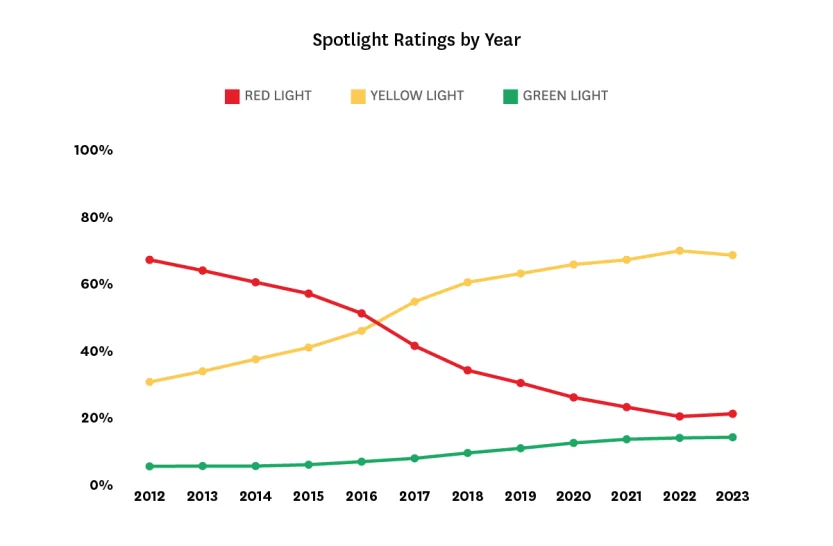
Below, you can learn more about the methodology, major findings, and the most common types of speech codes FIRE found and how to fix them.
If you’d like to encourage a school you care about to revise its speech codes, FIRE is here to help! For more information, contact: speechcodes@thefire.org.
Methodology
FIRE rated 375 four-year public institutions and 111 top private institutions on the extent to which their written regulations on student expression restrict free speech.
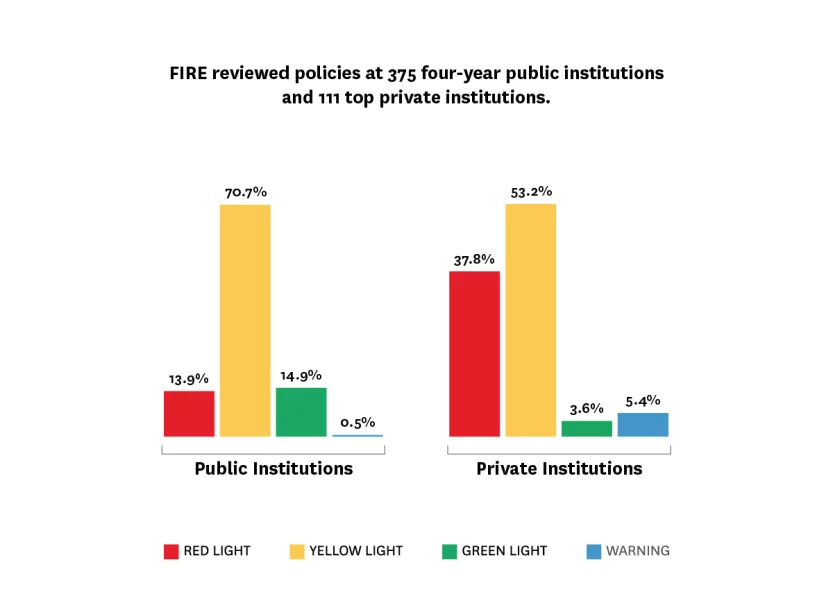
A red light institution maintains at least one policy that both clearly and substantially restricts freedom of speech, or bars public access to its speech-related policies by requiring a university login and password for access.
A yellow light institution maintains policies that could too easily be applied to suppress protected speech, or maintains policies that, while clearly restricting freedom of speech, restrict relatively narrow categories of speech.
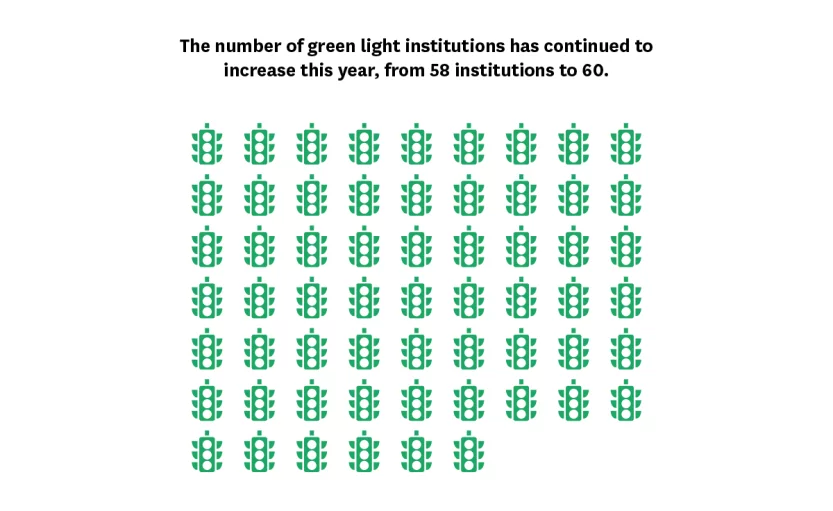
If FIRE finds that a university’s written policies do not seriously threaten campus expression, we award it a green light rating. (The speech code ratings do not take into account a university’s “as-applied” violations of student speech rights or other cases of censorship. For a look at the campus climate at top colleges that incorporates such factors, view FIRE’s annual College Free Speech Rankings.
When a private university clearly and consistently states that it holds a certain set of values above a commitment to freedom of speech, FIRE gives it a Warning rating to warn prospective students and faculty members of this fact.
Major findings
The percentage of schools earning an overall red light rating increased for the first time in 15 years, from 18.5% last year to 19.3% this year (13.9% of public schools and 37.8% of private schools). This reverse in progress was caused, in part, by the Minnesota State Colleges and Universities system, which adopted a new, restrictive harassment policy that caused all of its rated institutions to be downgraded to an overall red light rating.
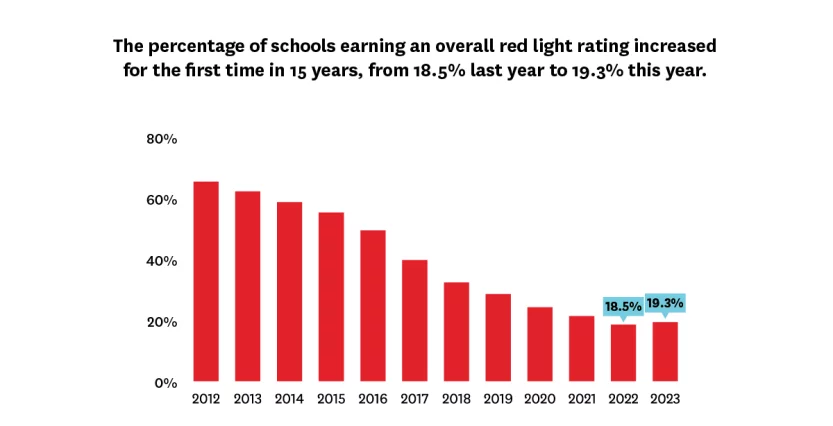
66.7% of institutions now earn an overall yellow light rating (70.7% of public schools and 53.2% of private schools).
FIRE was pleased to welcome the University of North Carolina at Asheville and the University of South Florida to the green light list this year, bringing the total number of overall green light schools to an all-time high of 60 (14.9% of public schools and 3.6% of private schools).
Eight schools, or 1.6%, earn a Warning rating. Six private schools and two public military academies earn this rating for clearly placing other values above free expression rights.
In contrast to restrictive speech codes, 92 university administrations or faculty bodies have now adopted free speech policy statements modeled after the “Report of the Committee on Freedom of Expression” at the University of Chicago (the “Chicago Statement”), actively committing their institutions to upholding freedom of expression. This year, lawmakers and university regents took action to enshrine a commitment to free expression in official policy at public institutions in the state of Ohio and at all University of Texas institutions, respectively.
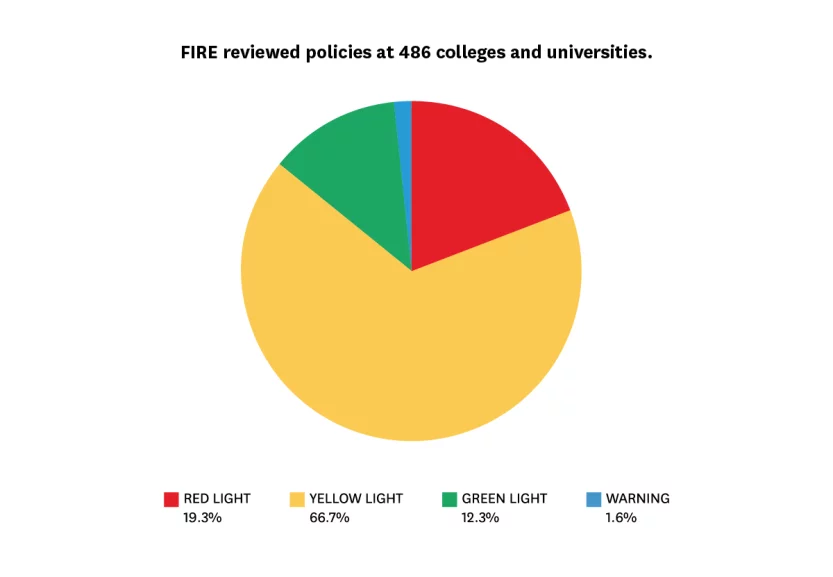
Common speech codes and how to fix them
Below are some of the most common types of restrictive speech codes FIRE found while reviewing colleges for this report. “FIRE’s Model Code of Student Conduct” and “Model Speech Policies for College Campuses” webpages provide examples of how to regulate these areas without infringing on speech.
FIRE’s Model Code of Student Conduct
FIRE’s Model Speech Policies for College Campuses
Harassment and bullying policies
Harassment isn’t protected by the First Amendment, but schools typically define harassment and bullying so broadly that their policies encompass protected speech. For example, Adams State University defines sexual harassment as “unwelcome conduct that is of a sexual nature or is based on a person’s actual or perceived sex, gender,” or other enumerated category, including “verbal, nonverbal, or physical conduct of a sexual nature.”[1]
To protect free speech, schools must use the Supreme Court’s standard for peer harassment in the educational setting: defining “harassment” as conduct that is “so severe, pervasive, and objectively offensive, and that so undermines and detracts from the victims’ educational experience, that the victim-students are effectively denied equal access to an institution’s resources and opportunities.”[2]
Civility policies
While a university has every right to promote a tolerant and respectful atmosphere on campus, a university that claims to respect free speech must not limit discourse to only the inoffensive and respectful. However, many schools have policies that effectively require compliance with certain civility standards. Evergreen State College goes so far as to say: “Civility is not just a word; it must be present in all our interactions.”[3]
Schools should use clearly aspirational language when discussing civility to avoid creating a chilling effect on free speech.
Bias reporting policies
Most campuses have some form of a “bias incident” reporting system: a mechanism for reporting speech or conduct motivated by bias toward a particular characteristic. While some of these policies only exist to provide support to those impacted by such incidents, most impose vague consequences for engaging in what is often constitutionally protected expression.
For example, Bates College states that examples of bias incidents include “hate speech,” “sexist jokes,” and “disparaging remarks on social media sites.”[4] The college explicitly “reserves the right to address bias incidents that do not rise to the level of a policy violation” through actions such as “education and training,” “remedial and supportive actions,” and “other Informal Resolution mechanisms.”[5]
Instead of arbitrarily punishing students for speech that violates overbroad policies, colleges should make clear their bias reporting teams will not investigate or discipline protected speech, and that any participation in informal resolution mechanisms like “education and training” is voluntary.
Protest and demonstrations policies
Universities may enact reasonable, narrowly tailored “time, place, and manner” restrictions that prevent demonstrations from unduly interfering with the educational process.[6] Far too many schools, however, regulate events on the basis of content or viewpoint, or maintain regulations that place prior restraints or other unreasonable burdens on public expression.
The University of Massachusetts Dartmouth, for example, tells students they must inform campus police 48 hours in advance of using the university’s sole area for demonstrations.[7]
Institutions must instead allow students to spontaneously use publicly available, outdoor areas of the campus for public expression. Without the ability to do so, students are prevented from responding to new and unfolding events.
Posting and distribution of materials policies
Universities often unreasonably restrict posting or distributing of written materials on campus. Kean University, for one, requires students to reserve an area for distributing materials five days in advance of the activity.[8]
Students must not be prevented from spontaneously distributing materials on campus, nor may they be prevented from posting written materials without first seeking permission.
Technology usage policies
Universities are no more permitted to infringe on free speech online than on the campus quad. Nonetheless, regulations on online speech are frequently in far worse shape than policies governing in-person speech, often placing impermissible restrictions on the content or viewpoint of expression.
Delaware State University’s policy, for example, bans users of any university technology, including the campus internet, from causing “offense to others” and even from causing “embarrassment” to the university itself.[9]
Instead, colleges should only ban speech and conduct that is not protected under First Amendment standards, such as harassment and true threats.